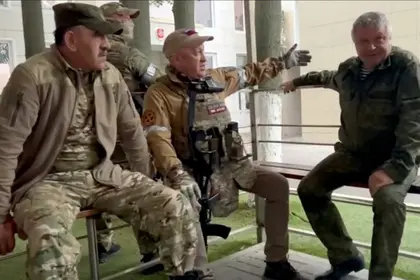After the unsuccessful Wagner rebellion, the Kremlin announced the mercenary group’s leader Yevgeny Prigozhin met with Vladimir Putin on June 29 to discuss the “assessment” of Russia’s war in Ukraine. It has been several weeks since the aborted uprising, but the West remains plagued with more queries than clarity. Is the Wagner group operating in Belarus? Was this another instance of Russia’s “maskirovka? Is Putin’s regime about to implode? It is hard to say for certain.
JOIN US ON TELEGRAM
Follow our coverage of the war on the @Kyivpost_official.
However, examining Russia’s statements – both explicitly and implicitly – it is evident that the Kremlin is perturbed by its own regime’s instability. Such apprehension has likely reverberated through the Russian political apparatus, and it is one that presents an opportunity for the West.
The Kremlin immediately blamed the West, saying “the mutiny plays into the hands of Russia’s external enemies. (...) We warn Western countries against undertaking even the slightest attempts to use the domestic Russian situation to achieve their Russophobic goals.”
On July 10 Sergei Naryshkin, the head of Russia’s Foreign Intelligence Service placed this paranoia on another level. Naryshkin said the US State department has become the “Ministry of Truth” and provided instructions to American media on how to report on the events in Russia.

Massive Russian Military Convoy Spotted in Mali: A Boost for Wagner’s Successor?
He alluded to American informational campaigns aimed at influencing the mindset of Russians to incite a violent resistance against the regime, one that could potentially lead to an armed uprising and motivate them to pit one form of power against another.
This has to be read in conjunction with his statement from July 7 when Naryshkin presented documents after the Russian Revolution in 1917 where he portrayed the civil war as a Pyrrhic victory. Referring to historical events from 1917 is not a mere coincidence. This signals that the Kremlin fears turmoil in the country.
However, for those familiar with Prigozhin’s rivalry with the Russian Ministry of Defense, the rebellion should not be surprising. The rivalry between Prigozhin and the Russian Ministry of Defense, coupled with Putin's growing reliance on Prigozhin’s Wagner Group amid a manpower shortage, incited tensions, particularly as the defense ministry began limiting resources and ammunition to the group.
The tension escalated to a climax at the Battle of Bakhmut and was further exacerbated by a June 10 announcement by the Russian Ministry of Defense to incorporate all irregular units, including the Wagner Group, into the Russian Armed Forces, subsequently triggering the rebellion.
While some observers hailed what they perceived as Putin's imminent political downfall in June, it is naive to expect the incident to prompt a transition towards a Western-style democratization in Russia, especially given that Prigozhin espouses a more extreme right-wing ideology than the current leader.
Nevertheless, this public infighting between Wagner and Russia's Ministry of Defense over the conduct of the war serves as an opportunity for the West.
The West can leverage this situation by conducting information operations within the Russian information space targeted towards Wagner-affiliated channels and ultranationalist online communities by highlighting the risks of being associated with the Russian Armed Forces.
By emphasizing the risk, the West would impede on the Kremlin’s initiative to centralize its armed forces into a more unified structure, prolonging the current decentralized state of the Russian Armed Forces and its lack of cohesion.
Such information operations should emphasize that Putin does not forgive traitors; there is no guarantee that Wagner Group mercenaries, whether they decide to sign the contract or not, would be safe from the Kremlin’s attempt to track down Prigozhin’s sympathizers.
Why stop there? On July 14, the Belarusian Ministry of Defense stated that Russia's Wagner mercenary group is training soldiers in Belarus. Exiled Belarusian opposition leader Svetlana Tikhanovskaya warned that Prighozin “can bring this war to Belarus.”
She is not alone. Putin’s decision to move Wagner mercenaries to Belarus also does not bode well for many Eastern European NATO member states. For instance, Poland is now securing its border. Parliament speakers of Estonia, Latvia and Lithuania issued a joint statement warning that “the emergence of the Wagner mercenary group in Belarus could make the security situation on the eastern borders of NATO and the EU even more precarious.”
Opening a second front might be on Putin’s wish list, and it is too early to forecast if Belarus will implode. However, Western information operations should also target people in Belarus and remind them of Wagner's threat.
As the Wagner-Ministry of Defense rivalry deteriorates over time, the group would serve as a thorn on the side for the Kremlin as it would erode the Russian Armed Forces’ monopoly on force. By employing information operations to sustain division between the Wagner Group and the Russian Ministry of Defense, specifically in Belarus and within Wagner-linked online communities, it would place the Kremlin on the defensive, prioritizing its own regime stability over its invasion of Ukraine.
The maxim that the best form of defense is a proactive offense holds especially true in this scenario. By placing the Kremlin on the defensive, it would help advance the West’s broader strategy to help Ukraine defeat the Russians on the battlefield.
Ivana Stradner is a Research fellow at the Foundation for Defense of Democracies where Will Kielm is a Research intern.
The views expressed in this opinion article are the author’s and not necessarily those of Kyiv Post.
You can also highlight the text and press Ctrl + Enter










